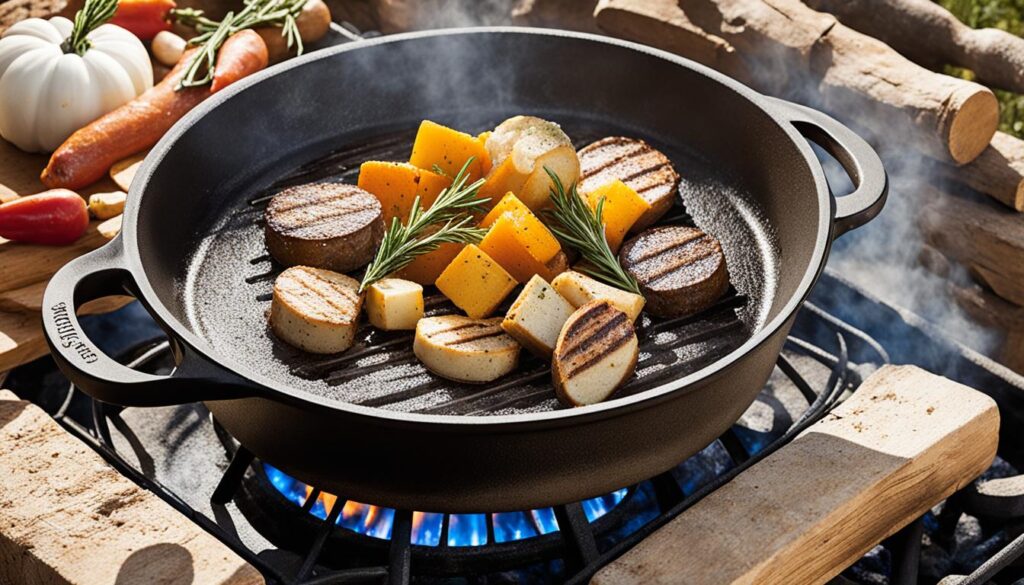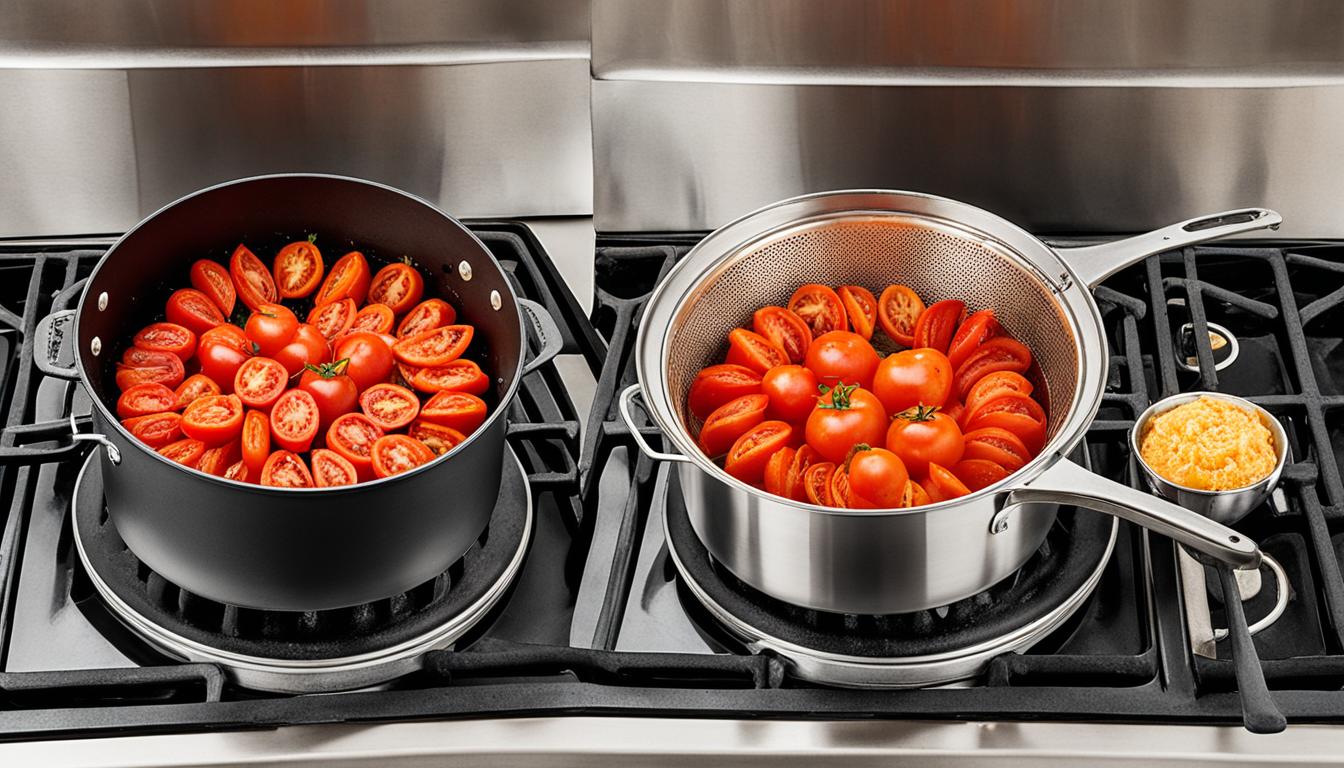Did you know that Americans consume over 1.3 billion pounds of fried food every year?
It’s no secret that frying food is a beloved culinary tradition. But when it comes to choosing the right kitchen appliance for frying, the options can be overwhelming. That’s why we’re here to help you navigate the deep fryer vs. Dutch oven debate and find the ideal solution for your frying needs.
In this article, we’ll compare the pros and cons of deep fryers and Dutch ovens, providing valuable insights to help you make an informed decision when it comes to your kitchen appliances. Whether you’re a fan of crispy fries, golden onion rings, or mouthwatering fried chicken, we’ve got you covered.
Deep Fryer: Pros and Cons
When it comes to frying food, a deep fryer is a go-to appliance for many cooking enthusiasts. Let’s take a closer look at the pros and cons of using a deep fryer for all your frying needs.
Pros of Using a Deep Fryer
- Precise Temperature Control: One of the significant advantages of a deep fryer is its built-in heating element and thermostat. This allows for precise temperature control, ensuring that your food is cooked evenly and crispy every time.
- Large Capacity: Deep fryers typically have a spacious cooking basket, allowing you to fry large batches of food at once. This makes it an ideal choice for hosting parties or gatherings where you need to prepare a substantial amount of fried food in a short amount of time.
Cons of Using a Deep Fryer
- Requires Significant Amounts of Oil: One of the downsides of using a deep fryer is the amount of oil it requires. Filling the fryer with oil can be costly, especially when deep-frying larger quantities of food. Additionally, disposing of used oil can be a hassle.
- Bulky and Difficult to Store: Deep fryers can be quite large and bulky, taking up valuable counter space in your kitchen. If you have limited storage space, this may be a consideration when deciding whether to invest in a deep fryer.
- Single-Purpose Appliance: Unlike other versatile kitchen appliances, a deep fryer is primarily designed for frying. If you’re looking for a multi-functional appliance that can perform other cooking methods, a deep fryer may not be the best choice.
In conclusion, while a deep fryer offers precise temperature control and the ability to fry large batches of food quickly, it requires a significant amount of oil and can be bulky in terms of storage. Consider these pros and cons when deciding whether a deep fryer is the right appliance for your frying needs.
Dutch Oven: Pros and Cons
A Dutch oven is a versatile piece of cookware that can be used for various cooking methods, including frying. Made of thick cast iron, the Dutch oven retains and distributes heat evenly, resulting in perfectly fried food. Whether you’re cooking chicken, fish, or even donuts, the Dutch oven ensures a crispy exterior and a moist, flavorful interior.
One of the standout features of a Dutch oven is its multifunctionality. In addition to frying, it can be used for braising, stewing, and baking. This makes it a valuable addition to any kitchen, providing options for a wide range of cooking needs. With a Dutch oven, you can easily transition from frying chicken to preparing a hearty stew or baking a loaf of bread.
Durability is another advantage of the Dutch oven. When properly cared for, it can last for generations, making it a long-term investment in your culinary journey. Cast iron is known for its ability to withstand high temperatures and heavy use, ensuring that your Dutch oven will remain in excellent condition for years to come.
However, it’s important to consider the cons of using a Dutch oven for frying. Unlike a deep fryer, a Dutch oven requires stovetop or oven preheating. This preheating process may take longer compared to the convenience of a deep fryer’s built-in heating element.
In addition, a Dutch oven typically has a smaller capacity compared to a deep fryer, which makes it less suitable for frying large quantities of food. While it can handle smaller batches with ease, if you’re planning to fry a large feast for a gathering or party, a deep fryer may be a more practical choice.

Overall, a Dutch oven is a versatile and durable cookware option for frying and many other cooking methods. It offers the advantage of even heat distribution and the ability to serve multiple culinary purposes. However, if you prioritize quick preheating and frying large quantities of food, a deep fryer may be the better option for you. Consider your frying needs and kitchen space to make the best choice for your culinary adventures.
Deep Fryer vs. Dutch Oven: Differences in Cooking Process
The main difference between a deep fryer and a Dutch oven lies in their cooking processes. Understanding these differences can help you decide which cooking equipment is most suitable for your needs.
When using a deep fryer, food is submerged in hot oil and cooked quickly and evenly. The deep fryer’s built-in heating element and thermostat provide precise temperature control, ensuring that your food comes out crispy and golden brown. The high heat and consistent distribution of heat in the deep fryer create a delicious and visually appealing texture.
On the other hand, a Dutch oven requires a smaller amount of oil or fat to fry food. The food is fried in this cookware at a slower pace. The Dutch oven is heated gradually, allowing the food to cook slowly while absorbing flavors from the oil or fat. This slower cooking process in the Dutch oven can result in a unique texture and flavor that differs from deep frying.
Both methods have their own advantages and create distinct culinary experiences. The deep fryer excels in delivering consistently crispy and evenly cooked food, while the Dutch oven offers a slower and more flavorful frying process.
Now that we have discussed the differences in the cooking processes between a deep fryer and a Dutch oven, let’s move on to the conclusion where we will help you choose the right cooking appliance for your frying needs.
Conclusion: Choosing the Right Appliance for Your Frying Needs
When it comes to deciding between a deep fryer and a Dutch oven for frying, it ultimately comes down to personal preferences and specific needs. If you frequently fry large batches of food and place importance on precise temperature control, a deep fryer may be the better option for you. With its built-in heating element and thermostat, a deep fryer ensures even cooking and crispy results. However, keep in mind that deep fryers require a significant amount of oil and can be bulky.
On the other hand, if you prefer versatility and don’t mind a slower cooking process, a Dutch oven may be the right choice. A Dutch oven can be used for various cooking methods, including frying, braising, stewing, and baking. Made of durable cast iron, it retains and distributes heat evenly, resulting in perfectly fried food. Just note that a Dutch oven may have a smaller capacity compared to a deep fryer, making it less suitable for frying large quantities of food.
Consider the pros and cons of each appliance and how they align with your frying needs and kitchen space. Think about whether you prioritize precise temperature control and efficiency or prefer a versatile piece of cookware that serves multiple cooking purposes. By carefully weighing these factors, you can confidently choose the appliance that best suits your preferences and enhances your frying experience.
